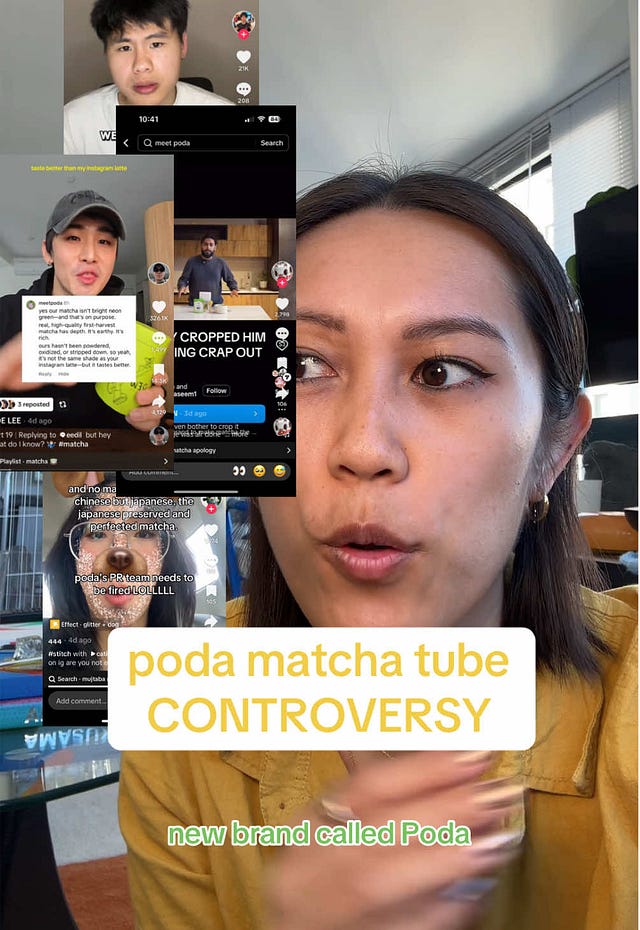This week, my thoughts and prayers are with the earthquake victims in Myanmar. As someone with Burmese heritage, Myanmar holds a special place in my heart, and many of my relatives still live there. Thankfully, my loved ones are safe, but thousands remain injured or trapped. The country's ongoing civil war and military rule make humanitarian aid more crucial than ever. Please consider donating here—every contribution counts 💕
In these challenging times, marked by natural disasters, global conflicts, and twisted politics, I also recognize that I/we are in a privileged position—to have the time and head space to discuss topics related to food, culture, and design. I just wanted to express how grateful I am for our corner of the Internet, to have a safe space to talk about f&b brands, consumer trends, and even indulge in TikTok drama.
News to indulge in this week…
There’s a lot of drama in matcha world right now—from Discord fights about content creator Kimi consuming 8 matchas a day to Houston matcha girl. I won’t get into the Kimi drama (or the Houston matcha girl drama) but it’s funny to me that the Internet is so furious about one’s matcha intake. Now turning to someone who might have deserved backlash: Poda Matcha. This new brand claims to be the "world's first matcha in a tube," but its marketing approach has sparked outrage. The founder, Mujtaba Waseem, posted a TikTok video (now removed) calling traditional tea ceremony utensils “crap” and suggesting that most matcha is "stale, clumpy, and made in China.” So what went wrong? For starters, matcha holds deep cultural significance in Japan, particularly in traditional tea ceremonies. The brand's comments were seen as culturally insensitive and carried Sinophobic undertones. Poda’s brand positioning ultimately reignited a conversation about cultural appropriation, some folks comparing this to the Bobba controversy last year. As a strong advocate for brands to lead with authenticity, I think that when creating products rooted in a culture outside of your own, it's absolutely essential to do your research, demonstrate cultural awareness, and show respect. I posted a deep dive into this on TikTok, so I'll keep my thoughts somewhat brief here.
 @foodbaby.clubI’M SPILLING THE MATCHATOK TEAAAA 🍵 matcha lovers have been fuming over a new brand—Poda matcha—which claims to be the first matcha in a tube… Product aside, Poda matcha rubbed people the wrong way when they called matcha utensils 💩 aka tools that are integral to traditional tea ceremonies. This sparked dialogue about the lack of cultural awareness—starting a matcha brand without acknowledging where it comes from and the traditions associated to it. I could go on!!! Anywho here are my two cents if you made it to the end of this caption 👀 #matcha #matchatok #podamatcha #matchapowder #matchabrands #cpg #founder
@foodbaby.clubI’M SPILLING THE MATCHATOK TEAAAA 🍵 matcha lovers have been fuming over a new brand—Poda matcha—which claims to be the first matcha in a tube… Product aside, Poda matcha rubbed people the wrong way when they called matcha utensils 💩 aka tools that are integral to traditional tea ceremonies. This sparked dialogue about the lack of cultural awareness—starting a matcha brand without acknowledging where it comes from and the traditions associated to it. I could go on!!! Anywho here are my two cents if you made it to the end of this caption 👀 #matcha #matchatok #podamatcha #matchapowder #matchabrands #cpg #founderTiktok failed to load.
Enable 3rd party cookies or use another browserErewhon sells $800K worth of Hailey Bieber smoothies every month. I loved reading this Vogue article on ‘The business of Erewhon’. It explores how shopping at Erewhon has become a modern day status symbol, reflects changing consumer perceptions of what is luxury, and breaks down the economics of their smoothie sales.
It’s a powerful reminder that in today’s luxury market, it’s not just about what you’re selling, but the story you’re telling and the lifestyle you’re offering.
I have more tea to spill and it’s on Remi Bader’s weight loss journey. I don’t normally write about influencers, let alone comment on someone’s weight loss but the controversy around Remi Bader is an important lesson for community building, trust, and authenticity. If you’re not familiar with Remi Bader, she’s an NYC influencer who originally built her social media following by promoting body positivity and inclusivity through her "realistic" fashion hauls, focusing on whether brands effectively catered to plus-size figures.
Tiktok failed to load.
Enable 3rd party cookies or use another browserOver the past years, Remi’s significant weight loss sparked speculation about Ozempic use, which she denied while blocking users who questioned her. The situation escalated when she revealed on Khloé Kardashian’s podcast that she underwent weight loss surgery in 2023. And now this is where it becomes a slippery slope. I agree that one’s weight is not anyone’s business, but at the same time, it literally is Remi’s business and personal brand. Remi built up her community based on body positivity and plus-size advocacy, and also capitalized on brand deals that aligned with these values. By concealing her weight loss surgery, and previously denying allegations that she did something to lose weight, she alienated followers who once saw her as a relatable voice. Her silence contradicted the authenticity she championed, making her messaging feel performative. The core issue here isn’t her weight loss but the erosion of trust in a brand built on “realness.”
Your $15 Chipotle bowl could now cost you $30 but you can pay later. DoorDash’s new ‘Buy Now, Pay Later’ (BNPL) partnership with Klarna allows customers to defer DoorDash payments via four interest-free installments or a later lump sum. While marketed as financial flexibility, research reveals BNPL loans disproportionately attract borrowers already carrying high debt loads. Over 60% of BNPL users hold multiple loans simultaneously, often while maintaining high credit card balances. Additionally, nearly half of BNPL borrowers have missed payments, with 34% doing so in the past year alone. By encouraging deferred spending on DoorDash purchases, BNPL might just deepen debt traps rather than solving affordability challenges.
Elon Musk is getting ready to enter the restaurant business. Pedestrians in Santa Monica Boulevard have a spotted a curved and silvery building that “looks as if a flying saucer had sailed out of a 1950s drive-in movie,” which is to become Tesla’s all-night diner, theater, and charging station—all in one.
It’s high times for Edible Arrangements. Edible Brands is launching Edibles.com, an e-commerce marketplace for hemp products including Cann drinks and Wana gummies. From fruit arrangements to buds—this move marks a natural expansion into a new kind of "edible" market.
My latest take on packaging design: branding will take a backseat and ingredients will become the star. Consumers will increasingly scrutinize product contents over packaging aesthetics. Ironically, brands can capitalize on this trend by making ingredient lists a design focal point. For instance, Mark & Spencer’s new cereal line simply features it’s ingredients.
I'm diving deeper into the non-alcoholic (NA) space and these are the latest brands on my radar:
Dappy—offers NA beverages with mood-lifting ingredients for a guilt-free buzz. Their flavors include 'Don't Text Your Ex' for spice lovers and 'Hangxiety Not Included'. I wish I was drinking Dappy in college…
Oosoo—non-alcoholic sparking tea inspired by natural wine. I tried both flavors (green tea, mint + lime and hibiscus, ginger + currant) and enjoyed them all.
Seoul Tonic—a super-powered tonic, designed to drink before drinking made from Korean pear extracts. Everything about this brand is so hip.
Now that’s a wrap for this week! I’m dying to know what other people think of Poda Matcha and also the controversy around Remi Bader. Let’s spill more tea in the comments 👀
🙋🏼♀️ where else to find me?!
call me gen z but i’m most active on tiktok, then on instagram.
food baby club is a weekly newsletter covering insights at the intersection of food, culture & design. if you enjoyed reading this, please consider sharing with a friend 💚








The matcha drama is something else